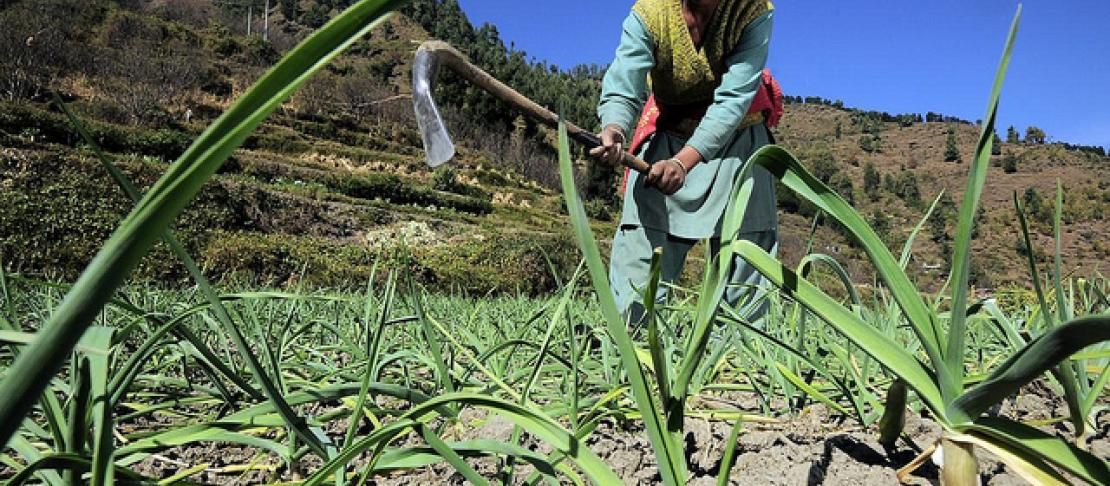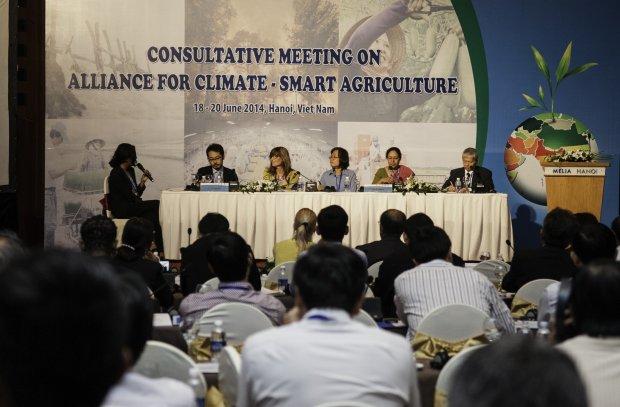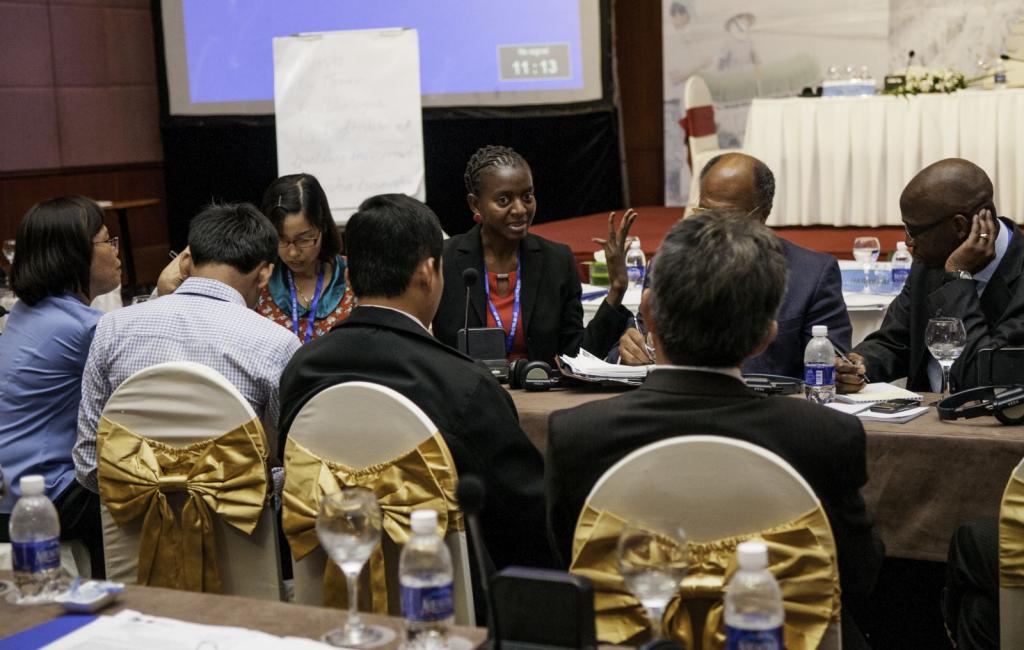Getting climate-smart talk on the top agenda

Progress is underway for a Global Alliance on Climate-Smart Agriculture. What policies, strategies and plans are needed at regional, national, and local levels and across landscapes?
“If climate change was a language, we’re currently all speaking different dialects,” said Debisi Araba, Technical Advisor on Environmental Policy to Nigeria’s Minister of Agriculture and Rural Development.
His observations at the Alliance for Climate-Smart Agriculture (ACSA) consultation held in Hanoi, Vietnam, echoed others among the 140 delegates, who met in late June to hammer out an inclusive strategy for including climate change in agricultural policy.
During the opening discussions of the three-day event, Hiroyuki Konuma, Regional Representative for Asia and the Pacific for the Food and Agriculture Organization of the United Nations (FAO), said the conference presented an “opportunity to identify common needs and objectives and create coordinated actions.”
It will also pave the way for clear messages to be developed ahead of the UN Secretary General’s Climate Summit in September, when the Alliance will be launched.

Panel discussion chaired by Dr. Rathana Peou, SEA Scenarios Regional Coordinator CCAFS- IRRI based in Hanoi, Vietnam
Understanding the lingo
The emerging voluntary Alliance, which has evolved into a ‘movement’ over several conferences, is committed to stressing the importance of mainstreaming climate change into national agricultural policy, agricultural practices, food systems and social policy.
An action-oriented coalition, the Alliance intends to unite a motley crew of governments, farmers, scientists, private sector and civil society. It is also a global platform where members share experiences, expertise, contacts and support.
The aim is to achieve significant, measurable and scalable benefits for food security and climate mitigation and adaptation by promoting three pillars of change: sustainable and equitable increases in agricultural productivity and incomes; building greater resilience of food systems and farming livelihoods; and reduction or removal greenhouse gas emissions associated with agriculture where possible.
During the conference, action groups were divided into two themes: the creation of enabling environments and building a knowledge base. (Read related story: What do we need to know to make Climate-Smart Agriculture a reality?)
One framework, one voice
The enabling environments model, co-led by the Governments of Vietnam, South-Africa and The Netherlands, is intended to integrate Climate-Smart Agriculture (CSA) into policy, strategies and planning at regional, national, and local levels and across landscapes.
For example, changing public policy frameworks by linking resilience and disaster risk reduction efforts; or reducing greenhouse gas emissions by encouraging big business to take responsibility and invest in a climate-smart value chain.
Among discussions, participants from Laos and South Africa, Nigeria and the Philippines agreed that scoping initiatives are necessary now to identify where countries are currently in terms of implementing CSA agricultural practices.

Deligates discuss the climate smart allicance
"Different countries have different levels of understanding of Climate-Smart Agriculture,” said Hlami Ngwenya, Manager: Knowledge and Communications at FANRPAN (Food, Agriculture, Natural resource Policy Analysis Network).
"Policy Scoping initiatives aim at identifying how the different countries are responding to the issues of climate change, where the knowledge gaps are as well as ways of mobilizing the critical mass needed for responsiveness,” she added.
Such national frameworks should be government-led, though not necessarily government-funded. Also, transparent and clear national frameworks on CSA will enable governments – and donors – to see where gaps need to be filled.
And while the private sector will not cough up direct funding for CSA, it can be leveraged to ensure practices are adopted.
The private sector can choose to privilege suppliers, which adopt climate smart agricultural techniques. Rathana Peou, CCAFS Regional Scenarios Coordinator, added:
This comes back to you and I, and the realization that we are part of the solution.”
National CSA-specific frameworks would provide common templates for translating national concerns to a global audience.
"A farmer in the backwaters of Nigeria can get access to what the farmers are doing in Laos through the template of a national framework,” said Araba. “The Alliance should bridge that gap,” as well as build capacity among national staff, he said.
From the ground up
The Alliance then becomes a facilitator, said Harry Palmier, Senior Partnerships Adviser of the Global Forum on Agricultural Research (GFAR). “The farmers will help identify the messages and define what [CSA] is. Ownership should be at the grassroot level,” he said.
That will be vital for building on-farm biodiversity and resilience, noted Sonali Bisht, from the Institute of Himalayan Environmental Research and Education, India. Farmers will need to have a voice in shaping what they grow and how.
But their initiatives have to be supported by policy frameworks: “It’s a matter of scale and scope,” she said.
It is important farmers grow a variety of different crops, but have access to markets to sell whatever they can grow,” she said.
On the front line
The debate on whether the Alliance needs to define its purpose any further was quashed by the urgency of climate change itself. “Let’s define what works from a scientific point of view, and scale up those successes,” said Araba. “We know what needs to be done, let’s do it.”
Leocadio Sebastian, CCAFS Regional Program Leader for Southeast Asia noted that the CGIAR’s fifteen research programs are committed to supporting CSA to the tune of about US$ 600 million per year. “A really strong show of commitment to action that hopefully others will follow soon,” he said.
The front-line movement for CSA is well on its way. A new cohesive language, the sum of many evolving dialects, is taking shape.
Read more from the CSA meeting in Hanoi: What do we need to know to make Climate-Smart Agriculture a reality?)
Further resources:
The consultative meeting was organized by the governments of Vietnam, South-Africa and The Netherlands, with support from the Global Forum on Agricultural Research (GFAR), FAO, CGIAR/CCAFS, Asian Development Bank (ADB) and the Government of Italy, for an Alliance for Climate-Smart Agriculture.
Georgina Smith is a Communications Specialist working for International Center for Tropical Agriculture (CIAT) based in Vietnam. She also helps with communication for CCAFS in the Southeast Asia region.



